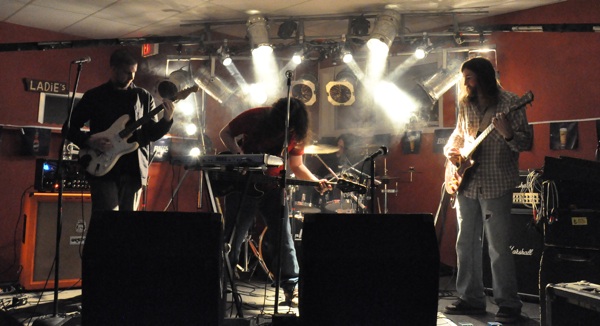
I am sitting with Easy Bleeders’ drummer Grant Carabin at the Sandbar in Dominion, and a four-piece band called Thought Machine is on stage. Carabin makes the above comment during one of several unstructured “improv” sessions the band performs that night. For most bands, you would call these stretches of unscripted creativity “jams”, but somehow that word doesn’t convey what was going on. Jazz musicians jam. Phish jams. When Thought Machine improvises, though, it is as if the band is receiving transmissions from deep space, interpreting the intricate, complex messages and reproducing them using guitars, bass and drums—the resulting sound is challenging, often bewildering, but always deeply enjoyable.
The Sandbar show took place this past Sunday. Earlier in the week, I caught up with Thought Machine for an interview. It was a summery day in late May. Guitarist Scott MacLean sported a t-shirt emblazoned with the logo of The Ifs, self-proclaimed “Secret Agents of the British Invasion.” The legend of the Ifs is a Greek Tragedy set in early 1960s England: a quartet of schoolmates hears the sounds of Chuck Berry and Elvis Presley at a high school dance and forms a band the next day; within a year, The Ifs are the most popular pub band in England; tragedy strikes when the British Royal Family, the transport union, and the BBC conspire to bring the band’s meteoric rise to a screeching halt. It’s a great story: too bad not a word of it is true. In reality, The Ifs are simply a respectable cover band from Buffalo, New York who like to get into character.
The story of Thought Machine is less glamorous but equally compelling. Begun as a two-piece—featuring current Pranks drummer Rob Rushton alongside front man Brett Waye—the band slowly morphed into a four-member progressive rock juggernaut. The current line-up includes Waye on bass, keyboards and vocals, MacLean and Marc Langille on guitars (the conventional dynamic of “lead” and “rhythm” simply doesn’t apply) and drummer Adam Wedgewood. In years past, Wedgewood, Waye, and Langille were also members of Magnum Opus, a progressive metal group which has since been disbanded.
Thought Machine makes music that resists categorization: their upcoming debut Maiden Voyage is at one moment sparse and melodic, the next punishingly heavy, the next catchy and upbeat. The album kicks off with “Gordian Knot”, a 22-minute prog-rock symphony. Part I (aka “The Binding”) opens with a heavy vamp on a single chord, which builds quickly to a noisy, dissonant crescendo. Just when the racket approaches its peak, the drums fall out, the keyboard enters and the track dissolves into a haunting dirge. After about 3 minutes of that, the drums are back and the band breaks into a Zeppelin-inspired riff in the spectacularly complex key signature of 17/8. And that’s all in the first track: “Gordian Knot” continues for 3 more parts (or “movements,” as Waye jokingly calls them), the last of which culminates in a brief reprise of the Zeppelin riff from “The Binding.” This sort of thing isn’t exactly typical of the local scene, which may explain why some folks find Thought Machine’s music difficult or intimidating.
Which isn’t to say that it’s all 22-minute epics and improper fractions: in fact, Maiden Voyage contains more than a few accessible, infectious tunes: “Chalk Lines” features some very memorable guitar work, and its groove is about as close as Thought Machine gets to straight-ahead rock; “Young Guns” tells a compelling story about a young man drafted into the army; and “The Season Unspoken,” a delicate acoustic ballad backed by subtle keyboards and hand percussion, provides a breather from all the pounding drums and wailing guitars.
The album’s undisputed high point, though, has to be “Persuasion.” All of Thought Machine’s strengths—stellar playing, inventive arrangements, simple melodies—come together in a sort of perfect storm to create a tight, anthemic rock song. The music geeks can appreciate the way the band switches both key and time signature several times; everyone else will just be shouting along with the chorus: “Persuasion is a powerful thing.”
Of Thought Machine’s many qualities, the one that stands out most prominently is professionalism: despite their outwardly slackeresque appearance (long hair, messy apartments, Floyd t-shirts), each of the band’s members displays a level of passion and dedication to their work that most people would envy. On the day of our interview, I meet MacLean and Waye downtown at around noon, and we head to New Waterford, where I sit in on an afternoon practice session. While the afternoon may seem like an odd time for a hard rock band to work, that day’s session was in fact a good deal later than normal: ordinarily, the band meets 3 mornings per week to rehearse and to write new material, and while conventional wisdom may associate rock music with late nights and booze, the band swears by their matutinal jam sessions: “It’s fantastic,” says MacLean, “It’s like [getting] up to go to work [. . .] doing what you love.”
As I mentioned above, Thought Machine’s music is far from typical: in the age of iTunes, they have opted to create a sprawling, 66-minute progressive rock album; in a business that encourages homogeneity, Thought Machine remain defiantly unique. When I ask Langille what the band does to attract an audience in such a seemingly hostile environment, he answers simply, “we brainwash them.” Persuasion: it’s a powerful thing.


Jayme says
about time! atta boy Langille!